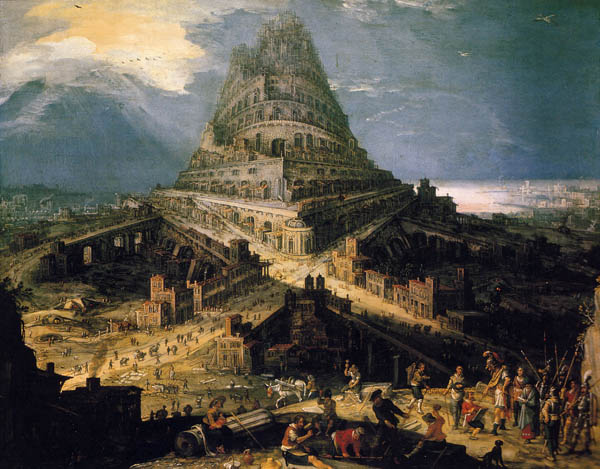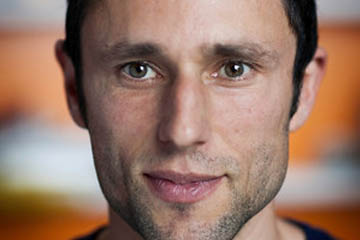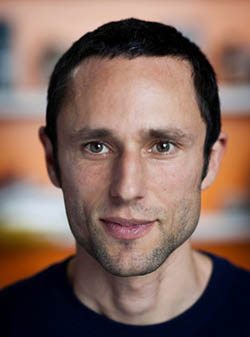
Illustration: Tower of Babel (Pinacoteca Nazionale)
A few months ago, I experienced an epiphany. It wasn’t triggered by a substantial event or transcendent explosion…in fact, it was caused by something as trivial as a reusable shopping bag.


Illustration: Tower of Babel (Pinacoteca Nazionale)
A few months ago, I experienced an epiphany. It wasn’t triggered by a substantial event or transcendent explosion…in fact, it was caused by something as trivial as a reusable shopping bag.
I was routinely cleaning my kitchen: wiping the counters and packing up any stray shopping bags, adding them to the holding bag we have stowed in the closet.
On that day, the holding bag was full… in fact, it was overfull.
After some generous stuffing, I was finally able to make them fit. But somewhere inside me, a light bulb flickered. This was supposed to be a “green” solution to the mountains of plastic bags wasted every day. These mesh bags were supposed to be the answer. Save the planet! Bring a reusable bag.
And yet, here I was (albeit more slowly) collecting another mountain of bags. It was on odd observation… so odd that I felt certain there’s some sort of irony when you realize you’re drowning in reusable grocery bags. It was the epiphany that we can’t “save the world” with the same thinking that created the problems in the first place.
A few hours after my intimate moment with the shopping bags, I found a link posted by a friend to the book “The Ascent of Humanity.” Intrigued, I read the online introduction, and immediately ordered the full 600 page book.
Flash forward a few months, and many pages later, and I can without a doubt profess that the book, written by the illuminating Charles Eisenstein, has profoundly affected the way I see the world. He had me at the opening words,
“Dedicated to the more beautiful world our hearts tell us is possible.”
I followed up with Charles to discuss a few of the main themes from his book, which is entirely available online, or as a hard copy.
BNT: You speak about the underlying anxiety that permeates modern life. Rather than attribute it to the on-going struggle to survive, you believe it is actually a feeling that “something is missing.” What is this something?

Charles Eisenstein
CHARLES: There are lots of things. Anxiety, like all emotions, has its proper function. It is the feeling, “Something is wrong around here” that won’t let you rest.
Well, something is wrong around here. Imagine if you were on the Titanic and you said, “Hey guys, I”m feeling a little anxious, what if there is an iceberg? It’s pretty foggy out. Hey, what’s that over there?” And everyone tells you to relax and have a drink. And the ship psychiatrist gives you some pills to help you be well-adjusted. Well-adjusted to what, though?
It is appropriate to be anxious until you know what the wrongness is. Then anxiety gives way to action. Anxious people know intuitively that something is wrong, but they haven’t identified what it is exactly. I’m not just talking about ecological and social degradation — it could be personal.
We are here to do something, to give of our gifts, and if we are not, anxiety will probably result.
Why do we tend to believe that “technology” will save us from the converging crises?
It has been promised us for a long time, and is part of the ideology of “ascent” that says we are destined to one day become, in Descartes’ words, the “lords and masters of nature.”
Well, coal didn’t usher in technological paradise, nor did electricity, nor did atomic power, nor did the computer… but maybe nanotechnology and genetic engineering will! Paradise is just one more miracle invention away! I think we are beginning to see through that promise. But ascent is written deeply into our psyche. “Technology will save us” is very similar to “The Kingdom of Heaven is coming.”
In both, our present problems will become irrelevant as a wondrous power comes to save us. And we don’t have to do anything but believe. The scientists are preparing the solutions as we speak!
“Our entire civilization is built on a story, a story of self.” (p76) Can you outline the main elements of our current story?
That takes a lot of pages to develop, but essentially it is that we are discrete and separate beings in a world of other. We are bubbles of psychology, we are flesh-encased souls, we are rational economic actors seeking to maximize self-interest, we are genetically-determined individuals seeking to maximize reproductive self-interest.
From this basic sense-of-self arises deep paradigms of control, since the interests of these competing selves are fundamentally opposed.
Mainstream society wants us to believe everything is fine. But you point out: “As these appearances diverge more and more from reality, so also grows our intuition of an inauthenticity to life.” (p89) How does this inauthenticity contribute to our collective apathy that permeates such disasters like the Gulf oil spill?
I’m glad you asked! You see, no matter what happens, as far as it affects most people’s lives in America, it is just pixels on a screen. You can play a video game and no matter what happens, nothing really happens.
The same goes for seeing war footage or an oil slick. You turn off the TV and go to the supermarket or drive to work or listen to the ballgame, and nothing has changed.
Our minds have gotten so used to virtual reality that we discount everything, we discount all words and images. That is why politicians and corporations can tell the most blatant lies, get caught in them, and still provoke little outrage.
On a deeper level, the apathy is also another consequence of this “discrete and separate self”. After all, what happens to you, or to the Gulf of Mexico, isn’t happening to me.
Sure it might affect me in some practical way, but if I insulate myself carefully enough it won’t hurt me. If you get sick, for instance, I can keep my distance so I don’t catch it, and I’m fine. If the Gulf dies, I can live somewhere else and it won’t affect me.
Once I asked my students, well, I had them read some horrifying things about dying forests, dying seas, and so forth, and asked them how they felt. They had been bred on multiple choice exams, so I gave them four choices:
Very few picked A, by the way. But I remember one guy (these were college undergrads) saying, “You know, as long as I can get a Big Mac, Coke, and fries for under five dollars, I really don’t care about the seas or the forests.” It is quite reasonable. As far as he can tell, his life is completely unaffected by anything he sees on the news.
Has your life been changed by the oil spill? Is food, clothing, shelter, entertainment, or anything else less available to you? So you can see how separate we are. But the thing is, this separation is an illusion.
When any being dies, something dies within ourselves as well. Because the true nature of the self is what you might call the “connected self”, the self of inter-beingness that is existentially dependent on other beings, not conditionally dependent.
To the mind, so immersed in the story of separation, that seems irrational, but the heart knows it is true. After all, you can feel it when you watch or read about this destruction — you feel a loss inside.
It’s tempting to want to lash out at “evil” corporations like BP, but you believe “one of the gravest errors activists make is to demonize their opponents.” How does framing the struggle this way actually hurt their goals?
One of the thought-patterns of separation that arose with agriculture is the division of the world into two forces, good and evil, light and dark. Before then, evil was not even a concept.
Just as the farmer sought to triumph over weeds and wolves and floods by mastering nature, so we think that if only we could triumph over evil in human form, the problems would be solved. Then there is the internal reflection of this ideology — we seek to triumph over the evil in ourselves, by whatever name we call it: greed, sin, fear, etc.
So, any revolution based on overthrowing evil is insufficiently deep. The mindset of defeating evil is no different than that of the Nazis or the Bolsheviks. They too sought to eliminate the evil that was gripping the world. Only their identification of that evil was different. But the thought-form was the same.
As Audre Lord said, “The master’s tools will never dismantle the master’s house.” I like to phrase it in a paradox: in the great world struggle between good and evil, the greatest weapon of evil is the idea that there is a great world struggle between good and evil.
For those disenfranchised with our destructive arc, they tend to believe humans are selfish and greedy by nature. And yet you state “greed is a result, not a cause of our economic system.” How does our system actually create greed?
It creates artificial scarcity. Greed is a natural response to scarcity.
The money system creates and perpetuates scarcity where there need be none, because of the way money is created through interest-bearing loans. Everything money touches becomes infected with that scarcity, even water, the most abundant substance on earth.
But I take issue with the “prosperity programming” folks who say “there is nothing wrong with money, it is just a kind of energy.” Money (as we know it today) has scarcity built into it. It is both a cause and an effect of scarcity mentality. I think that as we move into abundance mentality, the money system will change.
The argument can be made that every generation has felt “on the cusp” of a larger paradigm shift. Is there some truth to this statement? Or is the coming shift even more significant?
I think it is more significant. What you say is true, though I think ours is the first generation that is abandoning the project of Ascent in large numbers. I mean, the Sixties gave us a glimpse of it, but it is only recently that the project is obviously failing.
Just to give one example, in the first half of the 20th century, average life expectancy in the U.S. rose by something like 40%, but in the last 50 years it has risen by maybe 10%, and now some demographers think today’s children will have a lower life expectancy than their parents. And it isn’t because we’re spending less on healthcare than in 1950!
How can each of us connect with “the more beautiful world our hearts tell us possible?” Does your statement “The heart is for knowing, the head for reflection.” (p140) offer us a clue?
It is quite irrational to believe things will ever be much better than they are today. When you really study the situation the world is in, you realize that it is going to take a miracle, lots of miracles, so save us. The situation is quite hopeless, from a rational standpoint.
But I think we know in our hearts that we have the power to create a beautiful world. It will only happen, though, if we listen to our heart’s knowing enough to actually carry out the actions necessary.
We are called to live according to what our hearts know. That is the only sure guide. That is also a true revolution. The mental calculations we call ethics, minimizing your carbon footprint, etc., none of those are a sure guide. Like, should I fly to California to co-create a transformational event? Well, it burns a lot of jet fuel. How can I possibly add up all the costs and benefits? It is impossible.
When we try to choose from the head, we get into a maze of indecision, and even when we do choose we have no certainty and no courage. So now it is time to listen to our heart knowing.
I think if people did that, they wouldn’t cut down so many forests and do other bad things, because amid all the reasons why we “have to”, the heart says no.
For more Charles, check out full text of Ascent of Humanity, or order yourself a hard copy.
What do you think of the Ascent of Humanity? Share your thoughts in the comments!